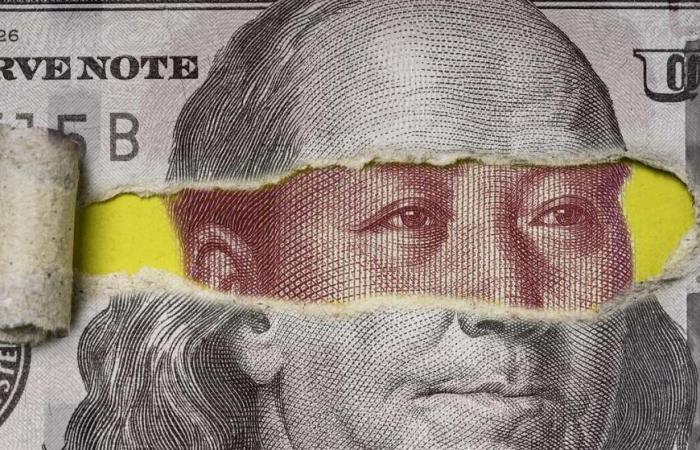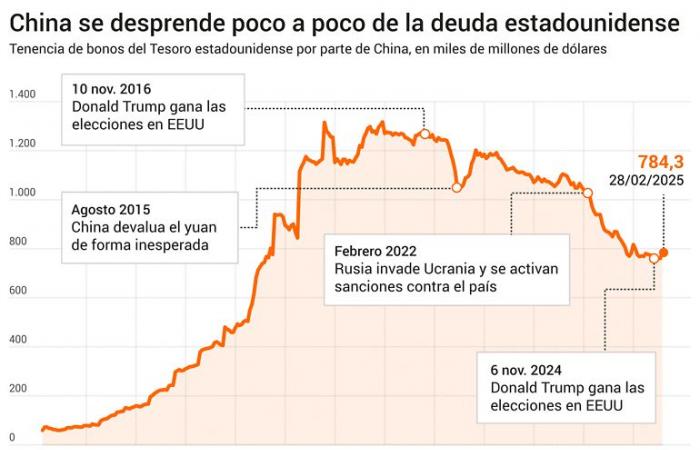While the American bonus sank and its profitability shot threatening to approach 5%, the entire world turned their heads towards Beijing. The great suspicion is that China had begun to respond to Trump’s commercial bravuces with a massive liquidation of its American debt portfolio. A few days later, the data pointed out that the Asian giant had not been responsible for the punishment of American bonds, but the truth is that, for a long time, and silently, it is reducing its financial exposure to the US, especially to long -term bonds.
The tariff conflict that Donald Trump has started, together with the attempts to intervene in the monetary policy of the Federal Reserve, are making the markets begin to doubt the status of refuge of the US bond, so far, the great asset free of reference risk in the world. For many investors and analysts, the American treasure bonds are no longer what they were, and more if the policy of the new administration continues for those paths. In a conflict in which Trump has focused on China, many analysts fear that the Asian country will use its American treasure debt portfolio as a weapon, with bond sales to punish the US.
However, this process began much earlier, and Today there are no signs that it has accelerated in recent monthssomething that Scott Besent, secretary of the US Treasury has recognized. China is reducing its American debt portfolio, yes, but Slowly, without aggressiveness, and everything indicates that it is a structural process more related to the fear of sanctions in the futureas happened to Russia for the Ukraine war, than Trump’s policies.
China’s international asset reserves are still dominated by the United States: 784,000 million in Treasury long -term bonds; 380,000 million in the American stock market; 230,000 million in agencies such as Freddi Mac and Fannie Mae; 60,000 million short -term treasure bonds and, finally, 20,000 million in short -term corporate debt. In total, about 1.5 billion dollars in assets of its great rival of the West, around 45% of the 3.24 billion accumulating the country in total in foreign assets.
Being the long -term treasure bonds the basis of its portfolio of American assets, the loss of attraction that these titles are suffering around the world as an active refuge is without a doubt that the Chinese government looks with concern. However, The exhibition of the Asian giant to these titles has been falling for several years and, beyond the short and medium term impact of Trump’s policiesChina is slowly decoupling the American bonds, especially those in the long term.
The fear of sanctions
What has China convinced it to move away from the American bonus with 10 years? Everything indicates that China’s great concern has more to do with sanctions, such as those that were imposed on Russia for the commercial war, than for other types of issues. In fact, if it is analyzed how it has been reducing the weight of these titles in their international asset portfolio, It is evident how the acceleration in sales has coincided with the imposition of sanctions on Russia.
What seems clear, and this is seen by Scott Besent, is that at the moment there has been no aggressive reaction from China in sales of American bonds as a weapon in the new commercial war. The secretary of the US Treasury has recognized in mid -April that “if the treasure bonds touched a specific level or if the Fed believes that there is a … I will not call them adversaries, but yes, a foreign rival, He is using the US debt market as a weapon, or trying to destabilize it with political objectives, I am sure we would work together and do something respect, but, simply, we have not seen that this is passingO “, I highlight Bessent.
-Beijing’s fear is that the billions invested in dollars disappear for a confrontation with the US. There are experts who highlight how China’s great concern with his portfolio of foreign assets are sanctions, such as those that Russia has suffered in recent years by the war in Ukraine. The sanctions imposed to the country since 2014, and which were increased by 2022 with the climbing the conflict, “are a expensive reminder of the United States financial hegemony through an international system based on the dollar,” said Pan Liu and Zhang Weiwan, from the University of Tsingua, and insisted on their report, as collected Financial Timesthat “the lesson to learn from China is clear.”
If it is analyzed how the long -term US treasure debt portfolio has evolved, the sales that have occurred since the conflict in Ukraine began and the first sanctions were imposed on Russia fit with the theory that the great concern of the Asian giant is that something similar can happen to it, and more taking into account the context of geopolitical tension that there is at this time between China and the United States Taiwan as the center of the conflict.
The peak of possession of this type of bonds occurred in 2014, when China accumulated about 1.3 billion dollars in these assets and began the Ukraine War, with the first sanctions to Russia by the West as a consequence. From that point he began to reduce the volume of American debt that China accumulated in its portfolio of foreign assets, and this was reduced by about 22% in the 8 years that passed until 2022. It was in that year, in February, when Russia carried out the large -scale invasion, and also when the most aggressive sanctions were activated, something that coincided with an acceleration in the sales of American bonds by China: 3 years have dropped 23.7%, more than in the previous 8 years.
Yu Yongding, a member of the Chinese Academy of Social Sciences, and former member of the National Planning Advisory Committee of the National Commission for Reform and Development of the Chinese Government, and former member of the Monetary Policy Committee of the Popular Bank of China, presented in 2022 his concerns about the risk of being tied to assets of a country that can freeze them in case of conflict. “LAsnciones to Russia have deteriorated the international credibility of the US, and have tremble the foundations of confidence in an international financial system dominated by the West. What country can be sure that the US will not freeze its assets in the future?“, se preguntaba Yongding.
Diversification: gold, short -term debt and agencies
The percentage of long -term American treasure bonds in the China’s foreign asset portfolio continues to fall slowly, but there is no rejection of any US asset. In fact, Treasury debt that packages agencies such as Freddi Mac and Fannie Mae has experienced strong growth in the decade in the Chinese portfolio, And only between 2018 and 2020 grew by 60%, to reach 261 billion dollars (currently remained around 230 billion dollars).
But it is not the only American asset that has increased while the weight of the long -term bonds falls: the debt titles of the American giant, but of shorter deadlines, are also increasing in China. In February 2022, when the second stage of the Ukraine War began and the most serious sanctions against Russia arrived, China had about 10,000 million dollars in the US short -term bonds, an amount that has skyrocketed in just three years to 60,000 million.
And, outside the US, Gold is also increasing weight in the China Reserve Asset portfolio: at the end of 2022, gold in the hands of the Central Bank of China reached 1,950 tons, an amount that has increased until it brushes the 2,300 tons in the month of March, according to the data published by the World Gold Council.







